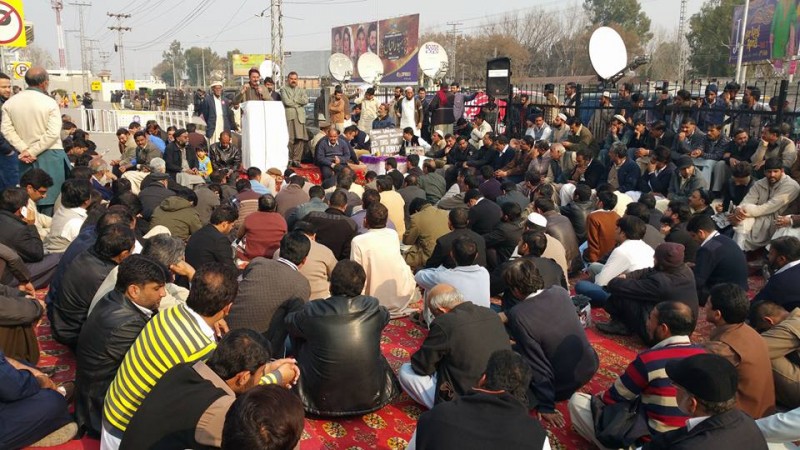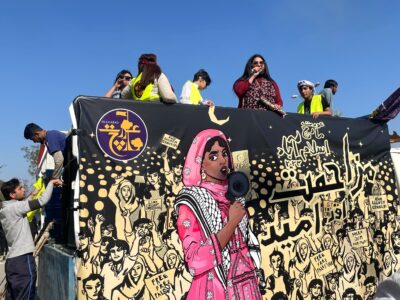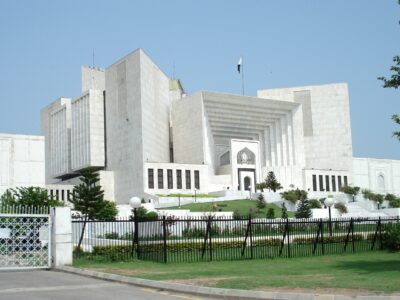
PIA employees protest outside Islamabad airport. Photo Courtesy: Awami Workers Party Facebook Page
The government's plan to privatise Pakistan International Airlines (PIA), the country's national carrier, as part of a deal with the International Monetary Fund (IMF), has touched off conversations around the country not only about the financial wisdom of doing so, but also about police brutality, corruption and workers’ rights.
Two people were killed in protests against the privatisation in Karachi, where police used aggressive force to break up the gathering. Beforehand, Pakistanis and opposition parties were already questioning the ruling party PMLN's management of the airline and wondering what would become of PIA workers. Not to mention the poor quality of the airline from a customer service perspective.
The proposed privatisation has touched a nerve in a variety of ways. Let's take a look at a few of them.
Oh, how the mighty have fallen
Once considered amongst the best airlines in the region, PIA has plummeted to below standard service and passengers have continued to complain. Blogger Alizay Abid recounts her experience:
Photo: #PIA #Sucks – waiting since 30 mins but no sign of luggage 😡 (at Allama Iqbal International Airport) http://t.co/lZBaPiZOsn
— Alizay Abid (@Alizay_A) January 18, 2015
Delays seem to be a pattern with PIA, as Ali Hassan points out:
@AirportPakistan‘s tweets regarding flight cancellations and delays just show how much #PIA sucks
— Ali Hassan (@enspec) April 26, 2014
The travel horror stories have long been circulated, Ahmer Murad says:
Heard so many people tell so many horror stories about #PIA recently. What's been done to the national flag carrier is terrible.
— Ahmer Murad (@AhmerMurad) December 26, 2013
But does consistent bad service mean there's no option but to privatise? According to media reports, the reasoning boils down to hefty losses. During the first two quarters of 2015 alone, the airline was at loss of about 80 billion rupees (about 1.1 billion US dollars).
National Assembly Member Mazia Hameed, who belongs to the ruling party PMLN, has been defending the government's decision to privatise on social media. Hameed tweeted:
This why gov is privatizing #PIA it has thousands of employees it can't afford #PIAStrike pic.twitter.com/puUFfEgZeu
— Maiza Hameed (@MaizaHameed) February 4, 2016
‘All working class people should unite’
Employees are deeply upset over authorities’ decision, as they fear loss of jobs as a result of a possible corporate takeover. Organisations and political parties focused on workers’ rights feel that the decision to privatise is being dictated under a condition of the International Monetary Fund (IMF) loan programme:
Aasim Sajjad: “All working class people should unite against the IMF-dictated privatization plan” #PIAStrike pic.twitter.com/nocsV6Xukw
— AWP Islamabad (@AWPIslamabad) February 3, 2016
The past few years PIA workers have gone on strike multiple times on various issues ranging from working conditions to wages. Last week, February 2, 2016, the Joint Action Committee of PIA Employees announced a strike after negotiations with government officials collapsed. Workers gathered at Benazir Bhutto International Airport, Islamabad and Quaid-e-Azam International Airport, Karachi, starting a sit-down that lasted six days and saw the death of two PIA staffers.
Protest of PIA Employees at Benazir Bhutto International Airport against PIA Privatization … #mohafizalert pic.twitter.com/aNamL51leT
— Mohafiz (@MohafizOfficial) February 1, 2016
Awami Workers Party also joined the sit in at Benazir Bhutto Airport, singing in protest with the workers:
In solidarity, netizens pointed out that the ruling party, now overseeing this privatisation plan, was once itself against the privatisation while in opposition:
“Those protesting against PIA Privatization are against Pakistan”—PMNS
Look who's talking😱👇😱#IsupportPIAprotestors pic.twitter.com/lKLqG3BQRD
— Aasia Ishaque (@aasia_ishaque) February 2, 2016
‘Absurdly fascistic handling by govt’
In order to disperse the crowd, authorities swiftly began crack down on protests. The authorities’ use of force in Karachi, where two people died, was widely criticised:
2 killed, 18 injured in firing on PIA employees. Whatever one may think about the PIA protest, this is absurdly fascistic handling by govt.
— Hasan Zaidi (@hyzaidi) February 2, 2016
In response, Nasir Jaffar, the CEO of PIA, handed in his resignation, which is yet to be accepted by Prime Minister Sharif. While law enforcement agencies continue to deny any involvement in the death of protesters, instead pointing fingers at unknown gunmen, a review committee has been formed to investigate the matter.
The government has the power to step in over workers’ strikes, thanks to the Pakistan Essential Service Maintenance Act of 1952. When invoked, strikes can result in dismissal of service, imprisonment for a maximum period of one year and a fine for the employees.
As political parties continue to release statements against the use of force by state authorities, some are blaming the previous government for contributing to the abysmal state of the airliner:
Those claiming PIA is an ‘asset’ need to peruse its financials.And also count # of redundant employees added by PPP. https://t.co/BpDt7xiF9Q
— Asad Khawaja (@asadmkh) February 2, 2016
Even though the workers have called an end to the strike, political part Pakistan Tehreek-e-Insaf (PTI) has called for a nationwide protest against the privatisation and killing of two employees.
The conversation continues
Despite the fact that protests have ended, the state of the country's national airline raises some serious questions. While some commentators feel that privatisation might seem a viable option, others blame overstaffing and years of neglect for the continued deterioration of the national airliner and demand more introspection.
It's clear that the issue is far from over, as employees continue to mourn the death of their colleagues, a conversation around the government's economic plans, police brutality, corruption and workers’ rights is currently underway.






